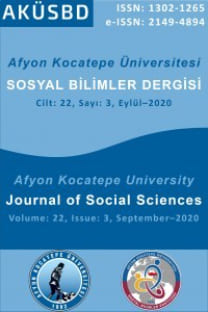Ekonomik Özgürlüklerin Dış Ticarete Etkisi: 34 OECD Ülkesi İçin Bir Panel Veri Analizi
Effects on Foreign Trade of Economic Freedom: A Panel Data Analysis for 34 OECD Countries
Economic freedom, export, import ARDL,
___
- Acar, M. (2010), Serbest ticaret, ekonomik özgürlükler ve refah, Bilig, Bahar-2010, 53, 1-28.
- Akıncı, M., Erkal, G. ve Yılmaz, Ö. (2015), Ekonomik özgürlükler ve yolsuzluk ilişkisi: Türkiye için bir zaman serisi analiz, HAK-İŞ Uluslararası Emek ve Toplum Dergisi, Cilt: 4, Yıl: 4, 8 (2015/1), 144-165.
- Aktan, C. C. (1997), Demokrasi ve Piyasa Ekonomisi Yönünden Türkiye Dünyanın Neresinde, Ege Genç İşadamları Derneği, 1996 Raporu, İzmir 1997.
- Altınışık, İ.; Çakmak, Y. ve Peker, H.S. (2011), Ekonomik özgürlükler ve refah, Selçuk Üniversitesi Kadınhanı Faik İçil Meslek Yüksekokulu, Sosyal ve Teknik Araştırmalar Dergisi, Yıl:1, Sayı:1, Mayıs 2011, 149-156.
- Beheshtitabar, E., Irgaliyev, A. (2008), The Impact of Economic Freedom on FDI Inflows to Developing Countries: The Case of the Middle East, Jönköpinginternational Business School Jönköping University.
- Breusch, T.S. ve Pagan, A.R. (1980), The lagrange multiplier test and ıts applications to model specification tests in econometrics. review of economic studies, 47(1), s.239–253.
- Çetenak, Ö.Ö. ve Işık, M. (2016), Ekonomik Özgürlükler İle Ekonomik Büyüme Arasındaki Nedensellik İlişkisi: OECD Ülkeleri Üzerine Bir Uygulama, Nevşehir Hacı Bektaş Veli Üniversitesi SBE Dergisi, 6 (1) 2016 s.1-16.
- Hanke, S. H. and Walters, S. J.K. (1997). Economic freedom, prosperity, and equality: a survey. Cato Journal, 17(2), s. 117-146.
- Lamaj, J. (2015), The ımpact of ınternational trade and competition market on developing countries, Management, Knowledge and Learning, Joint International Conference 2015, 27- 29 May 2015, Bari, Italy.
- Menyah, K., Nazlioglu, Ş. ve Wolde-Rufael, Y. (2014), Financial development, trade openness and economic growth in african countries: new ınsights from a panel causality approach. economic modelling, 37, 386-394.
- Miller, T. and B. Kim, A. (2017), 2017 Index of Economic Freedom, Institute for Economic Freedom, 1-12. Erişim tarihi: 12 Kasım 2018. https://www.heritage.org/index/pdf/2017/book/highlights.pdf
- Naanwaab, C. ve Diarrassouba, M. (2013), The ımpact of economic freedom on bilateral trade: a cross-country analysis, Cephas Naanwaab et al | Int.J.Buss.Mgt.Eco.Res., Vol 4(1),2013, s.668-672.
- Pesaran, M. H. (2004), General Diagnostic Tests For Cross Section Dependence In Panels. IZA Discussion paper No:1240, Institute of the Study of Labor, August 2004, Bonn, Germany.
- Pesaran, M.H. (2007), A simple panel unit root test in the presence of cross-section dependence. Journal of Applied Econometrics, 22, 265-312.
- Pesaran, M. H. ve Yamagata, T. (2008), Testing Slope Homogeneity in Large Panels. Journal of Econometrics, 142(1), s.50-93.
- Pesaran, M. H., Ullah, A. ve Yamagata, T. (2008), A Bias-Adjusted lm test of error cross section ındependence. Econometrics Journal, 11(1), s.105-127.
- Razmi, M.J. ve Refaei, R. (2013), The effect of trade openness and economic freedom on economic growth: the case of middle east and east asian countries, International Journal of Economics and Financial Issues, Vol.3, No.2, 2013, s.376-385.
- Sonora, R.J. (2008), On the ımpacts of economic freedom on ınternational trade flows: asymmetries and freedom components, FEB-Working Paper Series, Paper No:08-05, s.1-31.
- Tunçsiper, B. ve Biçen, Ö.F. (2014), Ekonomik özgürlükler ve ekonomik büyüme arasındaki ilişkinin panel regresyon yöntemiyle incelenmesi, Eskişehir Osmangazi Üniversitesi İİBF Dergisi, Ağustos 2014, 9(2), s.25‐ 45.
- Yenipazarlı, A. (2009), Ekonomik özgürlükler ve ekonomik büyüme üzerine etkisi: Türkiye üzerine bir zaman serisi analizi, (Yayımlanmamış doktora tezi), T.C. Adnan Menderes Üniversitesi, Sosyal Bilimler Enstitüsü, İktisat Ana Bilim Dalı, Nazilli-Aydın.
- ISSN: 1302-1265
- Yayın Aralığı: 4
- Başlangıç: 1999
- Yayıncı: Afyon Kocatepe Üniversitesi Sosyal Bilimler Enstitüsü
Sınıf Öğretmenlerinin Perspektifinden Değerler ve Değerler Eğitimi Uygulamalarının Değerlendirilmesi
Vedat AKTEPE, Hilal KESER, Şükran Ezgi ŞEREF
İklim Analizine Yönelik Bir Uygulama: Boyabat İlçesi Örneği
Türkiye’de Yoksullukla Mücadele Politikalarının Uzmanların Gözüyle Değerlendirilmesi
Eğitim Amaçlı Oyunlarda İş Modeli Seçeneklerinin Belirlenmesi
Yapay Sinir Ağları ile Trafik Yoğunluğu Tahmini
Ekonomik Özgürlüklerin Dış Ticarete Etkisi: 34 OECD Ülkesi İçin Bir Panel Veri Analizi
Bulanık CODAS Yöntemi ile Kripto Para Yatırım Alternatiflerinin Değerlendirilmesi
